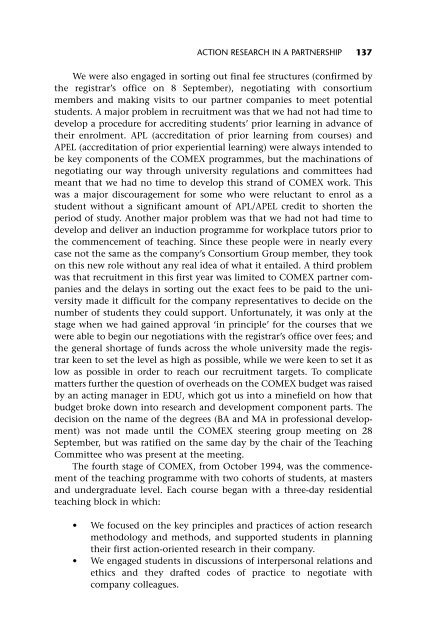Action Research A Methodology for Change and Development
Action Research A Methodology for Change and Development
Action Research A Methodology for Change and Development
Create successful ePaper yourself
Turn your PDF publications into a flip-book with our unique Google optimized e-Paper software.
ACTION RESEARCH IN A PARTNERSHIP 137<br />
We were also engaged in sorting out final fee structures (confirmed by<br />
the registrar’s office on 8 September), negotiating with consortium<br />
members <strong>and</strong> making visits to our partner companies to meet potential<br />
students. A major problem in recruitment was that we had not had time to<br />
develop a procedure <strong>for</strong> accrediting students’ prior learning in advance of<br />
their enrolment. APL (accreditation of prior learning from courses) <strong>and</strong><br />
APEL (accreditation of prior experiential learning) were always intended to<br />
be key components of the COMEX programmes, but the machinations of<br />
negotiating our way through university regulations <strong>and</strong> committees had<br />
meant that we had no time to develop this str<strong>and</strong> of COMEX work. This<br />
was a major discouragement <strong>for</strong> some who were reluctant to enrol as a<br />
student without a significant amount of APL/APEL credit to shorten the<br />
period of study. Another major problem was that we had not had time to<br />
develop <strong>and</strong> deliver an induction programme <strong>for</strong> workplace tutors prior to<br />
the commencement of teaching. Since these people were in nearly every<br />
case not the same as the company’s Consortium Group member, they took<br />
on this new role without any real idea of what it entailed. A third problem<br />
was that recruitment in this first year was limited to COMEX partner companies<br />
<strong>and</strong> the delays in sorting out the exact fees to be paid to the university<br />
made it difficult <strong>for</strong> the company representatives to decide on the<br />
number of students they could support. Un<strong>for</strong>tunately, it was only at the<br />
stage when we had gained approval ‘in principle’ <strong>for</strong> the courses that we<br />
were able to begin our negotiations with the registrar’s office over fees; <strong>and</strong><br />
the general shortage of funds across the whole university made the registrar<br />
keen to set the level as high as possible, while we were keen to set it as<br />
low as possible in order to reach our recruitment targets. To complicate<br />
matters further the question of overheads on the COMEX budget was raised<br />
by an acting manager in EDU, which got us into a minefield on how that<br />
budget broke down into research <strong>and</strong> development component parts. The<br />
decision on the name of the degrees (BA <strong>and</strong> MA in professional development)<br />
was not made until the COMEX steering group meeting on 28<br />
September, but was ratified on the same day by the chair of the Teaching<br />
Committee who was present at the meeting.<br />
The fourth stage of COMEX, from October 1994, was the commencement<br />
of the teaching programme with two cohorts of students, at masters<br />
<strong>and</strong> undergraduate level. Each course began with a three-day residential<br />
teaching block in which:<br />
• We focused on the key principles <strong>and</strong> practices of action research<br />
methodology <strong>and</strong> methods, <strong>and</strong> supported students in planning<br />
their first action-oriented research in their company.<br />
• We engaged students in discussions of interpersonal relations <strong>and</strong><br />
ethics <strong>and</strong> they drafted codes of practice to negotiate with<br />
company colleagues.

















